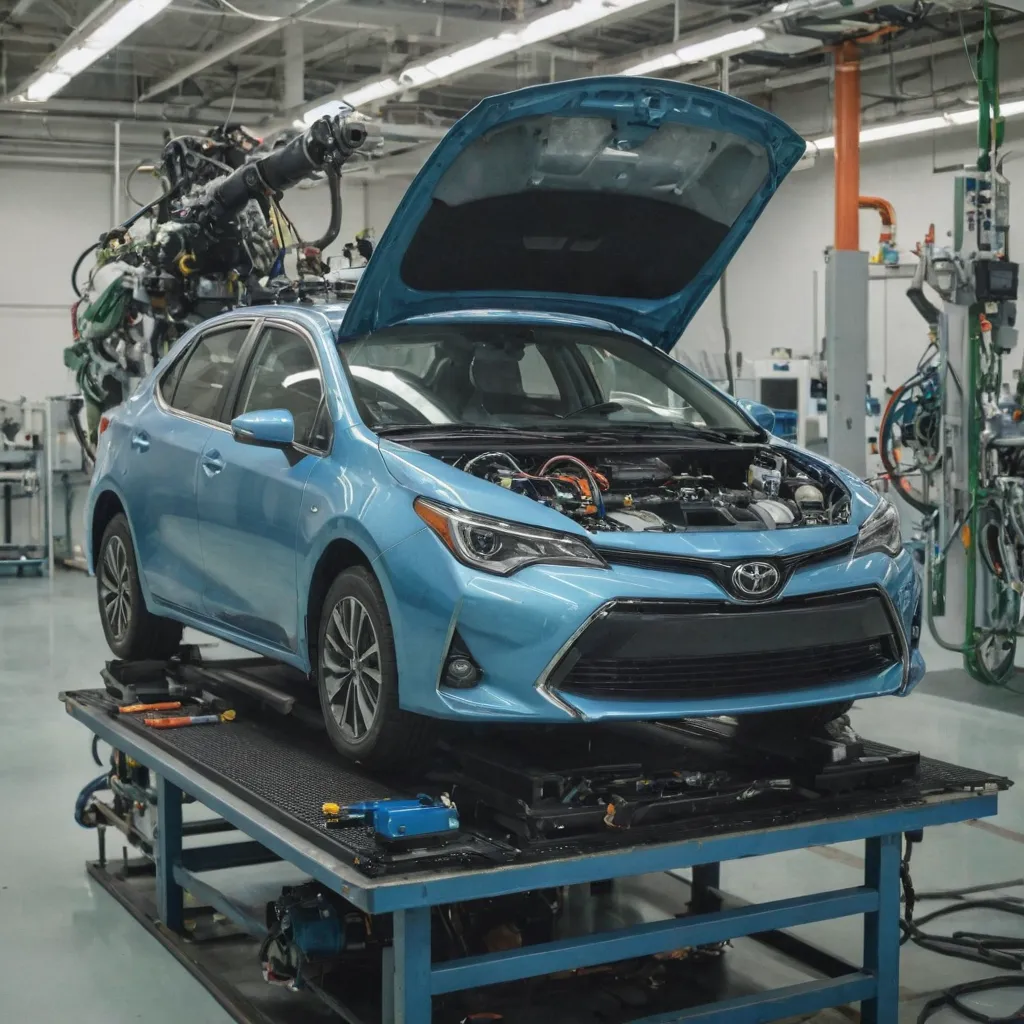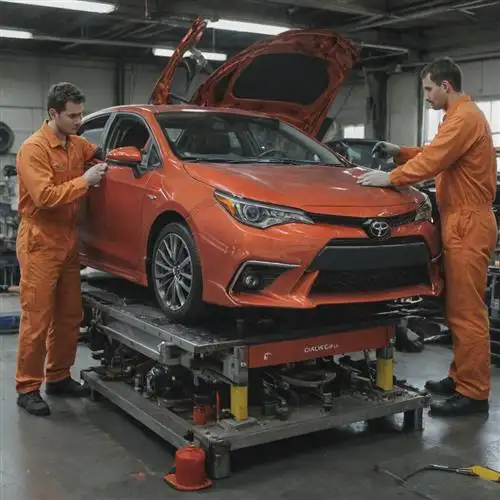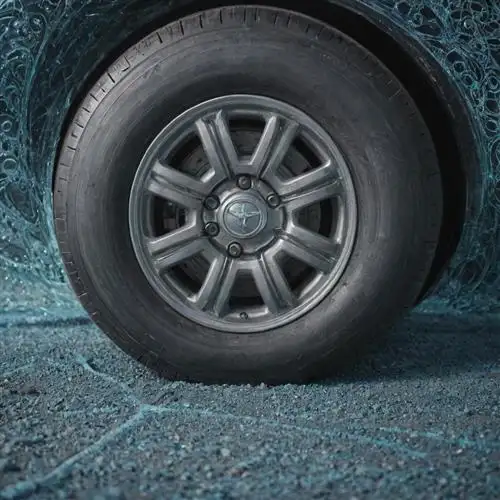
Importance of Regular Maintenance
Maintaining your Toyota Corolla is crucial to ensuring its longevity, performance, and overall value. Regular maintenance not only keeps your vehicle running smoothly but also helps prevent costly repairs down the line. The importance of regular maintenance cannot be overstated, as it encompasses a range of essential tasks that collectively contribute to the health and well-being of your Corolla.
One of the primary reasons for regular maintenance is to prolong the life of your vehicle's engine. By adhering to the manufacturer's recommended service schedule, you can ensure that your engine's vital components, such as the oil, filters, and spark plugs, are replaced or serviced at the appropriate intervals. This helps to minimize the wear and tear on the engine, reducing the risk of breakdowns and extending its overall lifespan.
Another crucial aspect of regular maintenance is the preservation of your Corolla's fuel efficiency. Over time, various systems in your vehicle, such as the fuel injectors, air filters, and tire pressure, can become compromised, leading to a decrease in fuel efficiency. By regularly servicing these components, you can maintain optimal fuel consumption, saving you money on gas and reducing your environmental impact.
Regular maintenance also plays a vital role in ensuring the safety and reliability of your Toyota Corolla. Important systems, such as the brakes, suspension, and steering, require periodic inspections and adjustments to ensure they are functioning properly. By addressing any issues promptly, you can avoid potentially dangerous situations and maintain the overall integrity of your vehicle.
Oil Change Intervals
Maintaining the proper oil change intervals is crucial for the longevity and performance of your Toyota Corolla. While the manufacturer's recommended interval is a good starting point, several factors can influence the frequency at which you need to change your car's oil. Understanding these factors and adapting your oil change schedule accordingly can help you protect your Corolla and maximize its lifespan.
The first and most important factor to consider is your Corolla's driving conditions. If you frequently drive in harsh environments, such as extreme temperatures, heavy traffic, or on unpaved roads, your oil may break down faster, requiring more frequent changes. In these cases, it's generally recommended to change your oil every 5,000 to 7,500 miles, or every 6 to 12 months, whichever comes first.
Another factor to consider is your driving style. Aggressive acceleration, frequent braking, and towing heavy loads can all put additional stress on your Corolla's engine and oil, shortening the oil's effective lifespan. If you tend to drive in this manner, you may need to change your oil more often, perhaps every 3,000 to 5,000 miles.
It's also important to consider the type of oil you're using in your Corolla. Synthetic oils generally last longer than conventional oils, so you may be able to extend your oil change interval if you're using a high-quality synthetic product. However, it's always best to consult your owner's manual or a trusted mechanic to determine the optimal oil change schedule for your specific vehicle and driving conditions.
In addition to the recommended oil change interval, it's essential to pay attention to the condition of your oil. During the oil change process, have your mechanic inspect the oil and look for signs of wear, such as a dark color or the presence of contaminants. If the oil appears to be in poor condition, it's best to change it regardless of the mileage.
Brake System Maintenance
The brake system is a crucial component of your Toyota Corolla, responsible for slowing and stopping your vehicle safely. Proper maintenance of this system is essential to ensure its optimal performance and longevity. As a professional content writer, I've gathered some valuable insights to help you keep your Corolla's brakes in top condition.
Regular Brake Inspections: It's recommended to have your Toyota Corolla's brake system inspected by a qualified mechanic at least once a year, or more frequently if you notice any changes in the brake performance. During this inspection, the mechanic will check the brake pads, discs, calipers, and brake fluid levels to ensure they are within the manufacturer's specifications.
Brake Pad Replacement: Your Corolla's brake pads will wear down over time, and it's important to replace them before they reach the minimum thickness. Waiting too long to replace the pads can lead to increased wear on the brake discs, which can be more costly to repair. As a general rule, it's best to replace the brake pads every 30,000 to 50,000 miles, or as recommended by the manufacturer.
Brake Disc Maintenance: In addition to the brake pads, the brake discs (or rotors) in your Corolla also need attention. Over time, the discs can become warped or unevenly worn, leading to a pulsing or vibrating sensation when braking. If this occurs, it's essential to have the discs inspected and potentially resurfaced or replaced to ensure smooth and consistent braking performance.
Brake Fluid Replacement: The brake fluid in your Corolla's system plays a crucial role in transmitting the force from the brake pedal to the brake calipers. Over time, the brake fluid can become contaminated or break down, reducing its effectiveness. It's recommended to have the brake fluid flushed and replaced every 2-3 years, or as specified by the manufacturer.
Brake System Cleaning and Lubrication: Keeping the brake components clean and properly lubricated can help extend their lifespan and ensure smooth operation. This includes cleaning the brake calipers, slides, and hardware, and applying a high-quality brake lubricant to the appropriate components.
Tire Rotation and Replacement
Maintaining the tires on your Toyota Corolla is crucial for ensuring a smooth and safe ride. Regular tire rotation not only extends the life of your tires but also helps to distribute wear evenly, preventing uneven tread patterns that can lead to a bumpy and unpredictable driving experience.
The recommended tire rotation interval for the Toyota Corolla is typically every 5,000 to 7,500 miles. This can vary depending on your driving conditions and habits, so it's essential to consult your owner's manual or a trusted mechanic for guidance. During the rotation process, your tires will be moved to different positions on the vehicle, such as from the front to the rear or from side to side.
When it comes to replacing your Toyota Corolla's tires, it's important to use the correct size and type of tire as specified by the manufacturer. Using the wrong tires can negatively impact your vehicle's handling, fuel efficiency, and overall performance. Additionally, it's recommended to replace all four tires at the same time, rather than just two, to ensure even wear and tear.
The lifespan of your Toyota Corolla's tires can vary depending on factors such as driving conditions, driving habits, and the quality of the tires themselves. As a general rule, you should consider replacing your tires when the tread depth reaches 4/32 of an inch or less. This can be easily checked using a tread depth gauge or the simple "penny test," where you insert a penny into the tread with Lincoln's head upside down – if you can see the top of his head, it's time to replace your tires.
When selecting new tires for your Toyota Corolla, it's essential to choose high-quality, all-season or winter tires (depending on your climate) that are designed to work well with your specific model. This will ensure optimal handling, traction, and safety in a variety of driving conditions.
Cooling System Maintenance
Maintaining the cooling system of your Toyota Corolla is crucial to ensure its longevity and optimal performance. The cooling system plays a vital role in regulating the engine temperature, preventing overheating and potential damage. By following a consistent maintenance routine, you can extend the life of your vehicle and enjoy a smooth, reliable ride.
One of the most critical components of the cooling system is the radiator. The radiator is responsible for dissipating the heat generated by the engine, allowing the coolant to circulate and maintain the optimal operating temperature. Regular inspection and cleaning of the radiator can help ensure its efficiency. Look for any signs of leaks, cracks, or damage, and address them promptly to avoid more extensive repairs down the line.
The coolant itself is another crucial element that requires attention. Toyota recommends replacing the coolant at regular intervals, typically every 30,000 miles or 24 months. Using the recommended type and concentration of coolant is essential, as the wrong mixture can lead to corrosion, reduced cooling capacity, and even engine damage. Be sure to monitor the coolant level and top it up as necessary.
The water pump is another component that plays a crucial role in the cooling system. This pump circulates the coolant through the engine and radiator, ensuring an even distribution of heat dissipation. Over time, the water pump can wear down and become less effective, leading to cooling issues. Replacing the water pump as part of your maintenance routine can help prevent unexpected breakdowns and ensure your Toyota Corolla's cooling system continues to function at its best.
In addition to the radiator, coolant, and water pump, the cooling system also includes hoses, belts, and the thermostat. These components work together to maintain the optimal temperature, and regular inspection and replacement, if necessary, can help prevent costly repairs. For example, worn or cracked hoses can lead to coolant leaks, while a malfunctioning thermostat can cause the engine to run too hot or too cold.
















